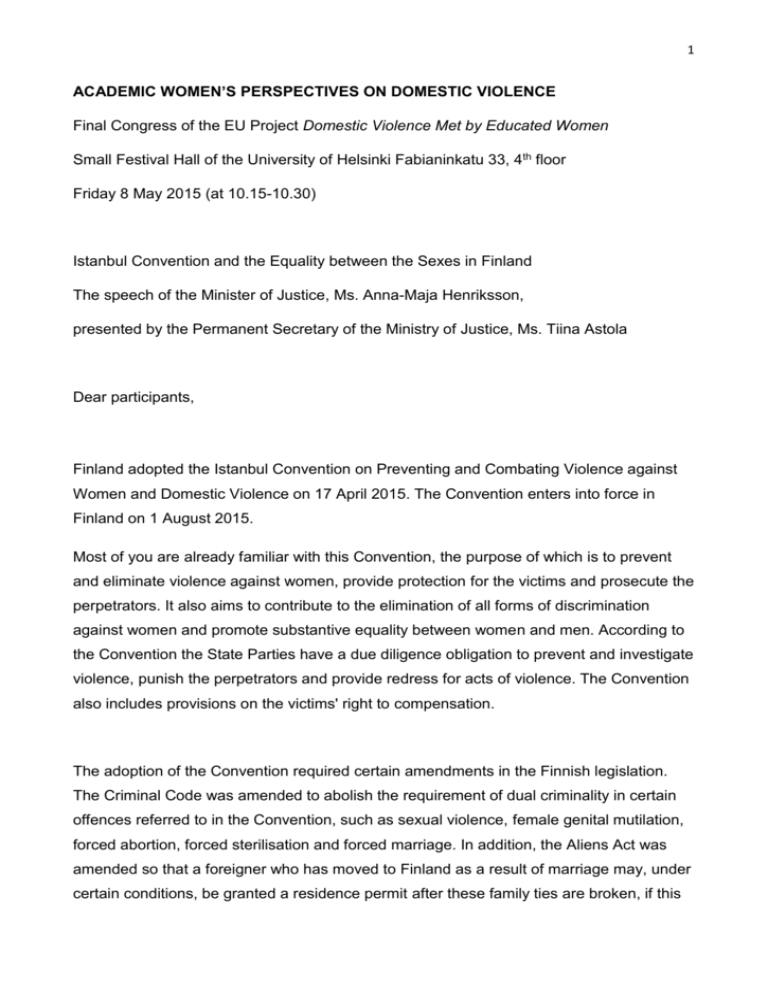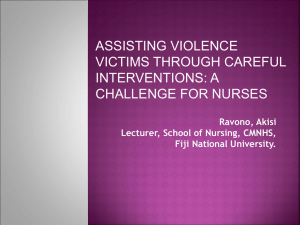
1
ACADEMIC WOMEN’S PERSPECTIVES ON DOMESTIC VIOLENCE
Final Congress of the EU Project Domestic Violence Met by Educated Women
Small Festival Hall of the University of Helsinki Fabianinkatu 33, 4th floor
Friday 8 May 2015 (at 10.15-10.30)
Istanbul Convention and the Equality between the Sexes in Finland
The speech of the Minister of Justice, Ms. Anna-Maja Henriksson,
presented by the Permanent Secretary of the Ministry of Justice, Ms. Tiina Astola
Dear participants,
Finland adopted the Istanbul Convention on Preventing and Combating Violence against
Women and Domestic Violence on 17 April 2015. The Convention enters into force in
Finland on 1 August 2015.
Most of you are already familiar with this Convention, the purpose of which is to prevent
and eliminate violence against women, provide protection for the victims and prosecute the
perpetrators. It also aims to contribute to the elimination of all forms of discrimination
against women and promote substantive equality between women and men. According to
the Convention the State Parties have a due diligence obligation to prevent and investigate
violence, punish the perpetrators and provide redress for acts of violence. The Convention
also includes provisions on the victims' right to compensation.
The adoption of the Convention required certain amendments in the Finnish legislation.
The Criminal Code was amended to abolish the requirement of dual criminality in certain
offences referred to in the Convention, such as sexual violence, female genital mutilation,
forced abortion, forced sterilisation and forced marriage. In addition, the Aliens Act was
amended so that a foreigner who has moved to Finland as a result of marriage may, under
certain conditions, be granted a residence permit after these family ties are broken, if this
2
person or his or her children have been subjected to violence or abuse by the spouse
during the relationship.
Also the Finnish shelter services had to be improved to comply with conditions laid down in
the Convention. As of the beginning of this year, the State has been responsible for
funding the shelter services. This ensures that all victims of domestic violence have equal
access to these services free of charge. The current appropriation allocated for this
purpose is enough to ensure the present level and scope of the services. In order to
develop an extensive network of shelter services covering the special needs of, for
instance, the ageing, persons with disabilities, unmarried persons, the Roma, immigrant
women and sexual minorities, the appropriation must be increased. The shelter services
have already been improved, but we still need more services for victims of sexual violence.
Hopefully the adoption of the Istanbul Convention will lead to intensified measures to
reduce violence against women. To achieve the goals of the Convention we need
extensive and coordinated cross-sectoral action plans. First of all, we need to draw up an
implementation plan. Finland is obliged to submit a report on the implementation of the
Convention to the Council of Europe. In the spirit of the Convention, the national
parliaments should be invited to participate in the monitoring process. The Convention also
obliges the State Parties to coordinate the measures to prevent and combat violence
against women and domestic violence on a national level. For this purpose, the
Government intends to appoint a national coordinating body.
In many respects Finland is one of the leading countries in the world when it comes to
equality. For example, if equality is measured by women's participation in working life and
political decision making, Finland is among the top countries in the world. In the recent
Parliamentary Elections, 83 women and 117 men were elected as Members of Parliament.
Compared to the previous Parliamentary Elections, the share of female Members of
Parliament was slightly reduced. Gender balance is of significance especially when
decisions on targeting of resources and measures are made. The female Ministers of
Justice have had an active role in the legislative reforms to improve the position of victims
of sexual and domestic violence.
During the term of Minister Henriksson stalking has been criminalised and the provisions
on sex offences have been amended. The new provision that prohibits stalking entered
3
into force at the beginning of 2014. The act to amend the provisions on sex offences,
drafted by the Ministry of Justice, entered into force in September 2014. Also a new
provision on sexual harassment was added to the Criminal Code.
Another important amendment is that rape of a minor will always be treated as aggravated
rape, and in this case the penal scale stretches from two to ten years in prison.
It is also worth noting that all sex offences except for sexual harassment are now subject
to public prosecution. In my opinion, this is one of the most significant improvements,
because even though these issues are discussed more openly than before, the threshold
for reporting sex offences is still far too high.
Minister Henriksson has also strived to improve the position of crime victims. To this end,
the Ministry of Justice drafted a proposal to introduce a victim surcharge. The victim
surcharge, paid by the offenders, would be used to increase the central government
funding for victim support services.
Female Ministers and Members of Parliament have also promoted the adoption of the
Istanbul Convention and increasing the funding of shelter services.
On the other hand, if violence against women is used as an indicator of equality, Finland is
unfortunately far from the top countries in the world. Both the number homicides and the
results of international surveys on women's experiences of violence show, that compared
to other western countries violence against women and domestic violence is far too
common in Finland. According to the survey published by the EU Agency for Fundamental
Rights last spring, Finnish women had on an average experienced domestic and other
kind of violence more often than women in other EU countries.
However, the real obstacles for preventing domestic violence and violence against women
are the general attitudes that tolerate violence. In order to increase the resources to
prevent violence against women and help victims of violence, we need to address the
conservative gender roles and recognise violence against women as a serious problem.
One of the reasons for the scarcity of resources for this purpose is that women are a
minority in the bodies responsible for economic decision-making.
It seems that we are equal in principal, but not in practice. We need more research-based
information on violence against women and opportunities to discuss these issues, like this
4
seminar today. It also important to bring forward different perspectives on this issue, such
as domestic violence met by educated women, to raise the awareness of the extent of this
phenomenon. The work to prevent violence requires many different kinds of actors. I would
like to thank the academic women for this seminar and wish you all fruitful seminar day.










